 MyDogBreeds
MyDogBreeds Muggin is originated from United States but Mucuchies is originated from Venezuela. Muggin may grow 57 cm / 22 inches shorter than Mucuchies. Muggin may weigh 39 kg / 85 pounds lesser than Mucuchies. Muggin may live 3 years more than Mucuchies. Both Muggin and Mucuchies has same litter size. Muggin requires High maintenance. But Mucuchies requires Low maintenance
Muggin is originated from United States but Mucuchies is originated from Venezuela. Muggin may grow 57 cm / 22 inches shorter than Mucuchies. Muggin may weigh 39 kg / 85 pounds lesser than Mucuchies. Muggin may live 3 years more than Mucuchies. Both Muggin and Mucuchies has same litter size. Muggin requires High maintenance. But Mucuchies requires Low maintenance
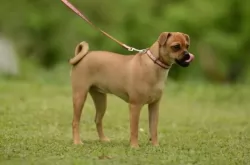 The Muggin is not a purebred dog but rather a cross breed. The hybrid dog population has exploding in the United States in the past ten to fifteen years. A lot of the success of crossbreeding can be attributed to the marketing of these dogs as “Designer Breeds”.
The Muggin is not a purebred dog but rather a cross breed. The hybrid dog population has exploding in the United States in the past ten to fifteen years. A lot of the success of crossbreeding can be attributed to the marketing of these dogs as “Designer Breeds”.
Designer breeds are developed because someone wants some of the characteristics of Breed X and some of the characteristics of Breed Y. Therefore, Designer breed XY is developed. In order to understand this hybrid dog, you need to understand the two purebred breeds they come from. The Muggin is the result of crossing the purebred Pug and the purebred Miniature Pinscher or Min Pin. So, we need to look at the origins of these two purebred breeds.
They are also referred to as Pin Pugs, Min Pin Pug, Pug Pin, Pugscher and were originally the Carlin Pinscher. However, these days there are other breeds besides the Pug and Min Pin making up the gene pool for the Carlin Pinscher. Because of this the Muggin has been separated from the Carlin Pinscher. The American Canine Hybrid Club has accepted the Muggin name for the Pug Min Pin cross.
Pugs are originally a Chinese breed and they were companions rather than working dogs of any kind. During the Han Dynasty they were the dogs of royalty. At the same time there were dogs very much like the pug in Japan and Tibet. The Pugs came to Europe by way of trades with the Dutch who then brought them to Europe. They were named the Mopshond and they caught the eye of the royalty in Europe as well.
Pugs were imported to the United States after the U.S. Civil War and in 1885 they were recognized by the American Kennel Club and called Pugs.
The Min Pin traces its origins to Germany a few hundred years ago. They were “ratters”, guarding the house and stables from all types of vermin. Most dog people believe that the Min Pin is much older than this, perhaps by thousands of years. Yet there is no detailed history to support that. Most believe the breed comes from the German Pinscher line. There might also be some Daschund and Greyhound in that line.
They were once called the Reh Pinscher. This was their name when they came to North America in 1919 and then the breed was renamed in 1972. The Miniature Pinscher Club of America was started in the early 1900’s while the AKC recognized the Min Pin in 1929. Today the Miniature Pinscher is a family dog, a companion.
The Muggin is a loving and loyal dog. All they want is for you to be happy and to share that happiness with them. They can also easily become a one person dog and bond intensely with that one person. They are not a hybrid that you can leave home alone while you go to work for 8 to 10 hours a day. No, the Muggin needs attention and lots of it. Despite this they are great with both kids and other dogs.
Because they are a cross breed, they are not recognized by the American Kennel Club. However, some hybrid registries do recognize the Muggin. These include the Designer Breed Registry, the International Designer Canine Registry, The Designer Dogs Kennel Club, the American Canine Hybrid Club, and the Dog Registry of America.
 The Mucuchies are a breed born in the Venezuelan mountains, in the late 1700s. They are rare today but were popular in the mountains for hundreds of years. They are believed to be a cross between the dogs brought by the Spanish Conquistadors in the 14th and 15th centuries and the local dogs. However, by the 1960s this rare breed was close to extinction.
The Mucuchies are a breed born in the Venezuelan mountains, in the late 1700s. They are rare today but were popular in the mountains for hundreds of years. They are believed to be a cross between the dogs brought by the Spanish Conquistadors in the 14th and 15th centuries and the local dogs. However, by the 1960s this rare breed was close to extinction.
Bred primarily as herders and watchdogs, their ancestry likely included the Algerian Mastiff, the Spanish Mastiff, the Great Pyrenees, and the Atlas Shepherd, otherwise known as the Aidi. The early development of the Mucuchies is attributed to Wilender Ferrari, DVM. At the time, Simon Boliva was fighting for Venezuelan independence in the city of Mucuchies. He adopted a member of the breed and named it for the city. The name stuck as the name for the breed.
Later in this timeframe, the Mucuchies was crossbred with the Pyrenean Mastiffs that friars brought to the Andes from their monasteries. With them, they also brought the sheep for the dogs to herd and guard. During the 1920s the breed spread throughout the country, but by the beginning of the 1960s there was a major decline in the breed. This was partly due to changes in culture and lifestyle in the Andes.
In 1961 a Mucuchies club was formed for the breed preservation and the breed was formally named the National Dog of Venezuela. The club was disbanded in the mid-1960’s and this led the breed to the edge of extinction. By 2008 there was another major push to save the breed. This effort came from the government who wanted to preserve the breed. In 2008, they created the Fundacion Nevado and sent six Mucuchies to the Waraira Repano Cable Car System in the El Avila National Park so that the dogs would be in a climatic environment as similar to the Andes mountain as possible. This was successful and the program was increased by Venezuelan President Hugo Chavez.
As the breed continued to develop the shepherding instincts were lost and the guarding aspects were strengthened. This left today’s Mucuchies as a breed of gentle, active dogs with strong characters and a loving disposition. They are gentle with their families but protective and aggressive with strangers. They are the only native breed of Venezuela and currently, there are programs in the mountains to re-establish and strengthen them.
In addition to their name for the town of Mucuchie, the breed is also called the Paramo’s Dog or the Snowy. These programs exist because in Venezuela they are near extinction once again. This is the result of inbreeding and more cross-breeding, this time with larger dogs like St. Bernards. Thus, the continued efforts by the Nevado Foundation with the assistance of the government to restore the original Mucuchies breed to Venezuela.
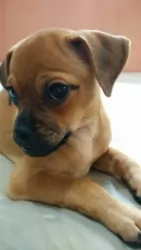 As previously mentioned, the Muggin is a cross between the Pug and the Miniature Pinscher. They are small, shave sturdy legs, floppy ears, and a wrinkled forehead for the most part. Like all hybrids however, all first generation dogs do not look the same. Some might resemble the Min Pin more and others the Pug. Some might have the stockier body of the Pug and the short tail of the Min Pin. Or one could have the Pug’s curly tail and the athletic body of the Min Pin. The snout can be short or long, the ears heavy and floppy or small and thin.
As previously mentioned, the Muggin is a cross between the Pug and the Miniature Pinscher. They are small, shave sturdy legs, floppy ears, and a wrinkled forehead for the most part. Like all hybrids however, all first generation dogs do not look the same. Some might resemble the Min Pin more and others the Pug. Some might have the stockier body of the Pug and the short tail of the Min Pin. Or one could have the Pug’s curly tail and the athletic body of the Min Pin. The snout can be short or long, the ears heavy and floppy or small and thin.
Their coats will usually be fine and short, and colors can vary a lot. They might be black and tan like a Min Pin, or more like a Pug with a solid color of cream, brown, black, white or golden. They also tend to shed quite a bit no matter which parent they take after the most. They will either have brown noses and black eyes or brown eyes and black noses or any combination of black and brown.
If Muggins are only bred to Muggins the second and third generations will resemble each other more than the first generations will. However, at this point many breeders will try to strengthen the breed by occasionally adding in to the gene pool other dog breeds.
 The appearance of the Mucuchies is that of a breed of large dogs who stand two feet at the shoulder and can weight one hundred pounds. They have a deep chest, heads that are wedge-shaped and skulls shaped like domes. Their muzzles are straight, and their nostrils are large on their black nose. The Mucuchies have dark eye and eyelids along with ears that are triangular in shape and medium in size. Their lips are black but this and he has a well-developed ruff.
The appearance of the Mucuchies is that of a breed of large dogs who stand two feet at the shoulder and can weight one hundred pounds. They have a deep chest, heads that are wedge-shaped and skulls shaped like domes. Their muzzles are straight, and their nostrils are large on their black nose. The Mucuchies have dark eye and eyelids along with ears that are triangular in shape and medium in size. Their lips are black but this and he has a well-developed ruff.
They are large, sturdy dogs with a grand appearance and tremendous energy. Their neck is strong, short and very muscular with wide shoulders and a straight back. The tail is much longer than their hocks and it is shaped like a fan and he raises it when he is alerted. They have a short, thick coat and most are white or white with gray, honey or black. This is a very attractive breed.
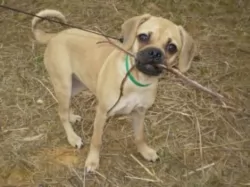 They are good with children but should be supervised.
They are good with children but should be supervised.
Energetic and loving little dogs.
Very adaptable if taken for walks or has space in a yard. Can live anywhere under those circumstances.
Very intelligent but strong willed dog. Needs strong leadership from their person.
 Good with children and very good with their own families. Might be a little standoffish with others.
Good with children and very good with their own families. Might be a little standoffish with others.
They no longer have the strong herding instinct but are outstanding guard dogs.
Yes but need land to run in. Don’t put this giant dog in an apartment. You will both be miserable.
Very intelligent and their ability and willingness to learn is very good.
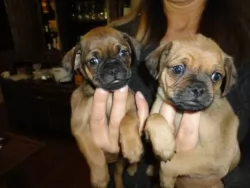 The first generation of Muggins may face all the health issues of either or both their parents, while second and third generations tend to have less health issues, They types of issues the first generation of Muggins might face include:
The first generation of Muggins may face all the health issues of either or both their parents, while second and third generations tend to have less health issues, They types of issues the first generation of Muggins might face include:
Nerve Degeneration – Degenerative Myelopathy or Dm – causes paralysis and eventually fatal.
 Because of their rarity and somewhat isolation, they do not have many genetic health concerns. They do however face at least a couple of the issues that most large dogs face.
Because of their rarity and somewhat isolation, they do not have many genetic health concerns. They do however face at least a couple of the issues that most large dogs face.
This can be a serious issue for such a large dog. It can cause arthritis and lameness.
This might be the biggest threat to the Mucuchies’ health. They are big dogs and if they injury limbs it can be quite serious.
The distension or inversion of the stomach and intestines is potentially fatal and must be treated immediately. Large dogs are prone to bloat and feeding schedules can go a long way in preventing it.
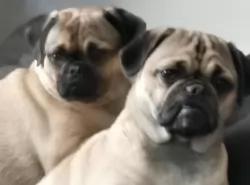 This crossbreed has a definite propensity to overeat and become obese from puppyhood. Feed the puppy a small dog dry food 3-4 times a day a total of ¾ of a cup to 1 cup.
This crossbreed has a definite propensity to overeat and become obese from puppyhood. Feed the puppy a small dog dry food 3-4 times a day a total of ¾ of a cup to 1 cup.
Again don’t over feed the adult Muggin or he will become obese easily. Feed at least twice a day one to one and half cups total.
High Energy
With the athleticism of the Min Pin taking precedence over the less active Pug, the Muggin is a fairly active dog. The Muggin is also not effective by the Pug’s difficulty with heat and cold. They love to go on long walks and need exercise to keep from being bored and destructive. However, remember there is a Pug in your Muggin and if she is not into exercise don’t try to get her to do more than she can.
You do want your Muggin to get enough exercise to fend off any tendency to be overweight. They are good at agility, jogging, obedience and watchdog activities.
 As mentioned in health concerns, feeding appropriately is critical to the Mucuchies’ health. Puppies need a high quality, large breed dry food 2-3 times per day at ½ cup each time. Don’t overfeed. Don’t exercise before or after eating to prevent bloat.
As mentioned in health concerns, feeding appropriately is critical to the Mucuchies’ health. Puppies need a high quality, large breed dry food 2-3 times per day at ½ cup each time. Don’t overfeed. Don’t exercise before or after eating to prevent bloat.
The adult Mucuchies should eat at least twice a day for a total of two and one-half cups. So, you might feed one and ¼ cup at each meal. Again, it is critically important that you don’t overfeed. Don’t feed before or after strenuous exercise and don’t let your Mucuchies eat too quickly in order to avoid bloat.
This is a large dog with generally very good health. His stamina and heart will impress you.
The Mucuchies is not an active inside dog, but he is a large dog that needs daily exercise. They need to be able to run or at least to trot. A large yard or dog bark is necessary. However, this big, double coated dog hates the hot weather and needs a cooler climate. Winter is fine with him. Don’t overwork them while they are growing. Walks are the best exercise for this breed.